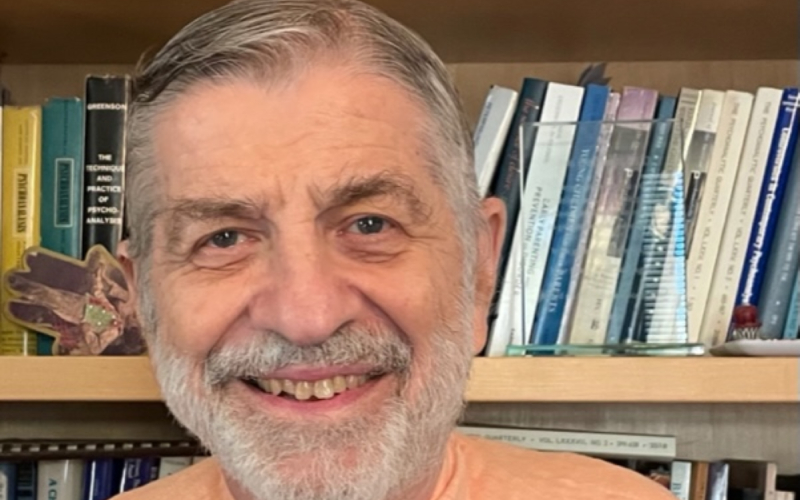“The basic principle in defense analysis is that one approaches what is going on right now – it’s an experience-near technique. You don’t make conjectures about what would be called experience-distant phenomenon until you have a lot of material, a lot of knowledge about the patient. As the treatment goes on you really stick with what the patient is doing right now.”

Leon Hoffman, MD
New York
Episode Description:
Leon shares with us what he sees as the fundamental method of analytic treatment, which “regardless of the manifest theoretical orientation of the therapist … are effectively utilizing the technique of interpreting defenses against unwelcome affects.” He emphasizes the importance of being interested in the patient’s defenses and less so the warded-off content. We consider the term ‘protection’ in place of ‘defense’; how these interventions are an amalgam of clarification and interpretation; and the source of the bad reputation that attaches to the concept of ‘defense interpretation’. He shares with us how this approach links with the neurosciences and the concept of implicit emotion regulation. We discuss the work of Berta Bornstein, who introduced the importance of defending against unpleasant affects. He discusses two cases of disruptive children and their use of aggression in an effort to avoid sadness and loneliness. We close with his sharing his view of our field and his conclusion that “analysis will survive – it’s too powerful a tool.
Our Guest:
Leon Hoffman, MD, is a psychiatrist and child and adolescent psychiatrist. He is a Training and Supervising Analyst at the New York Psychoanalytic Society and Institute. He is the Co-Director of the Pacella Research Center of NYSI. Among many publications, he is co-author with Timothy Rice and Tracy Prout of Regulation Focused Psychotherapy for Children (RFP-C): A Psychodynamic Approach and with Timothy Rice Defense Mechanisms and Implicit Emotion Regulation: A Comparison of a Psychodynamic Construct with One from Contemporary Neuroscience. In 2022, he presented the Norbert and Charlotte Rieger Psychodynamic Psychotherapy lecture at the American Academy of Child and Adolescent Psychiatry on “Helping Parents Spare the Rod: Addressing Their Unbearable Emotions” based on a paper he authored with Tracy Prout. He presented the Paulina Kernberg Memorial Lecture at Weill Cornell Medicine Child & Adolescent Psychiatry Grand Rounds. On Regulation Focused Psychotherapy: An evidence-based psychodynamic treatment for children with disruptive behaviors. And The Bruce A. Gibbard Lectureship in Psychiatry, University of Vermont, Department of Psychiatry.
Linked Episode:
Episode 38: A Psychoanalyst Studies ‘Why is it easier to get mad than it is to feel sad?’ with Leon HoffmanRecommended Readings:
Hoffman, L. (2007) Do Children Get Better When We Interpret Their Defenses Against Painful Feelings? Psychoanalytic Study of the Child 62:291-313.
Hoffman, L. (2014). Berta Bornstein’s Frankie: The Contemporary Relevance of a Classic to the Treatment of Children with Disruptive Symptoms. The Psychoanalytic Study of the Child 68:152-176
Rice, T. R., & Hoffman, L. (2014). Defense mechanisms and implicit emotion regulation: a comparison of a psychodynamic construct with one from contemporary neuroscience. Journal of the American Psychoanalytic Association, 62(4), 693-708.
Prout, T. A., Rice, T., Chung, H., Gorokhovsky, Y., Murphy, S., & Hoffman, L. (2021) Randomized controlled trial of Regulation Focused Psychotherapy for Children: A manualized psychodynamic treatment for externalizing behaviors. Psychotherapy Research, 32(5), 555-570.
Hoffman, L. (2020). How can I help you? Dimensional versus categorical distinctions in the assessment for child analysis and child psychotherapy. Journal of Infant, Child, and Adolescent Psychotherapy, 19(1), 1-15.
Leon Hoffman, Tracy A. Prout, Timothy Rice & Margo Bernstein (2023): Addressing Emotion Regulation with Children: Play, Verbalization of Feelings, and Reappraisal, Journal of Infant, Child, and Adolescent Psychotherapy, DOI: 10.1080/15289168.2023.2165874
Prout, T. A., Malone, A., Rice, T., & Hoffman, L. (2019). Resilience, defenses, and implicit emotion regulation in psychodynamic child psychotherapy. Journal of Contemporary Psychotherapy, 49(4). 235-244.
Hoffman, L., & Prout, T. A. (2020). Helping parents spare the rod: Addressing their unbearable emotions. Psychoanalytic Study of the Child, 73(1), 46-61.
